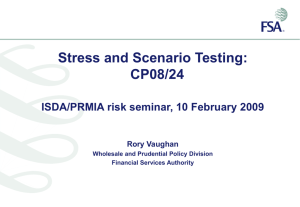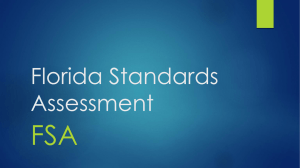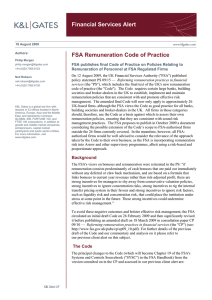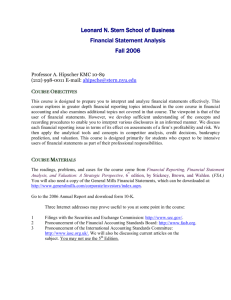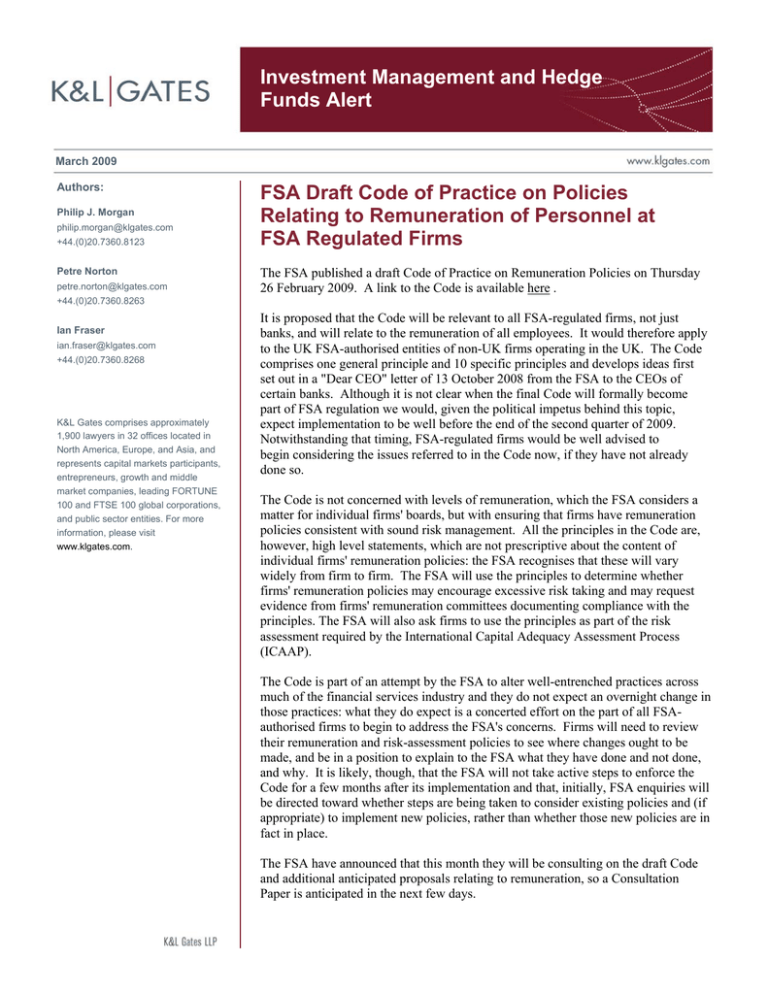
Investment Management and Hedge
Funds Alert
March 2009
Authors:
Philip J. Morgan
philip.morgan@klgates.com
+44.(0)20.7360.8123
Petre Norton
petre.norton@klgates.com
FSA Draft Code of Practice on Policies
Relating to Remuneration of Personnel at
FSA Regulated Firms
The FSA published a draft Code of Practice on Remuneration Policies on Thursday
26 February 2009. A link to the Code is available here .
+44.(0)20.7360.8263
Ian Fraser
ian.fraser@klgates.com
+44.(0)20.7360.8268
K&L Gates comprises approximately
1,900 lawyers in 32 offices located in
North America, Europe, and Asia, and
represents capital markets participants,
entrepreneurs, growth and middle
market companies, leading FORTUNE
100 and FTSE 100 global corporations,
and public sector entities. For more
information, please visit
www.klgates.com.
It is proposed that the Code will be relevant to all FSA-regulated firms, not just
banks, and will relate to the remuneration of all employees. It would therefore apply
to the UK FSA-authorised entities of non-UK firms operating in the UK. The Code
comprises one general principle and 10 specific principles and develops ideas first
set out in a "Dear CEO" letter of 13 October 2008 from the FSA to the CEOs of
certain banks. Although it is not clear when the final Code will formally become
part of FSA regulation we would, given the political impetus behind this topic,
expect implementation to be well before the end of the second quarter of 2009.
Notwithstanding that timing, FSA-regulated firms would be well advised to
begin considering the issues referred to in the Code now, if they have not already
done so.
The Code is not concerned with levels of remuneration, which the FSA considers a
matter for individual firms' boards, but with ensuring that firms have remuneration
policies consistent with sound risk management. All the principles in the Code are,
however, high level statements, which are not prescriptive about the content of
individual firms' remuneration policies: the FSA recognises that these will vary
widely from firm to firm. The FSA will use the principles to determine whether
firms' remuneration policies may encourage excessive risk taking and may request
evidence from firms' remuneration committees documenting compliance with the
principles. The FSA will also ask firms to use the principles as part of the risk
assessment required by the International Capital Adequacy Assessment Process
(ICAAP).
The Code is part of an attempt by the FSA to alter well-entrenched practices across
much of the financial services industry and they do not expect an overnight change in
those practices: what they do expect is a concerted effort on the part of all FSAauthorised firms to begin to address the FSA's concerns. Firms will need to review
their remuneration and risk-assessment policies to see where changes ought to be
made, and be in a position to explain to the FSA what they have done and not done,
and why. It is likely, though, that the FSA will not take active steps to enforce the
Code for a few months after its implementation and that, initially, FSA enquiries will
be directed toward whether steps are being taken to consider existing policies and (if
appropriate) to implement new policies, rather than whether those new policies are in
fact in place.
The FSA have announced that this month they will be consulting on the draft Code
and additional anticipated proposals relating to remuneration, so a Consultation
Paper is anticipated in the next few days.
Investment Management and Hedge Funds Alert
Implementation of the Code, if it remains in its
current form, will undoubtedly give rise to
challenges for FSA-authorised firms including:
•
assessing risk and overcoming design
difficulties in matching bonus scheme structures
to risk appetite.
•
structuring deferred bonus schemes so that,
where appropriate, the payment of tax is also
deferred.
•
following the FSA lead but avoiding
complicated bonus schemes that provide little
incentive because they are not clear enough to
influence behaviours.
We have set out below a summary of the Code's
provisions:
General Principle
Firms must ensure that their remuneration
policies are consistent with effective risk
management.
The FSA believes that employees of a firm with
poor remuneration policies that are not aligned with
sound risk management may have an incentive to act
in ways that are misaligned with the firm's risk
profile.
Specific Principles
1. Boards and relevant remuneration
committees should exercise independent
judgment and demonstrate that their
decisions are consistent with the firm's
financial situation and future prospects.
Their members should have the skills and
experience to reach an independent judgment
on the suitability of the remuneration
policies, including the implications for risk
and risk management.
The FSA has stressed the importance of
remuneration committees exercising
independent judgment and believes that
remuneration committees should normally
include at least one non-executive director with
practical skills and experience in risk
management. The FSA understands that firms
need to offer competitive remuneration
packages but also believes that industry
comparables (which are currently commonly
used as the primary basis for the setting
performance measures) should be of secondary
importance in determining remuneration
policies. The FSA may require a firm to submit
an annual statement on their remuneration
policies, which should include an assessment of
such policies' impact on the firm's risk profile.
2. The procedures for setting compensation within
the firm should be clear and documented, and
they should include measures to avoid conflicts
of interest. Risk and compliance functions (in
consultation with the firm's HR function as may
be deemed appropriate) should have significant
input into setting compensation for business
areas.
The FSA emphasises that it would be good
practice for an independent risk function to
have a role in validating and assessing risk
adjustment data. This is particularly important
where personnel are involved in determining
remuneration within their own business area.
3. Compensation for staff in the risk and
compliance functions should be determined
independently of the business areas. They
should have different performance metrics, with
greater emphasis on the achievement of their
own objectives.
Business areas should not have undue influence
over the remuneration of control functions to
avoid any conflicts of interest.
4. Assessments of financial performance to
calculate bonus pools should be principally
based on profits. The bonus pool calculation
should include an adjustment for current
and future risk, and take into account the
cost of capital employed and liquidity
required.
The FSA considers profits to be a more suitable
performance measure than revenues because
employees may pay insufficient regard to the
quality of the business or its suitability for the
client. Profits should be risk-adjusted and
should account for future, or any other, risks.
There are a number of techniques available to
adjust profits and capital for risk, and the FSA
March 2009
2
Investment Management and Hedge Funds Alert
will expect firms to provide the FSA with
information as to how they have carried out
such calculations.
5. Firms should not assess performance solely
on the results of the current financial year.
Firms should recognise that profits are volatile
and subject to business cycles, which can
exaggerate performance. The FSA suggests
assessing employee performance on a moving
average, adjusting for risk and/or deferring a
proportion of the employee's remuneration.
This principle addresses concerns that financial
firms' employees have taken excessive longterm risks, knowing they would be compensated
in the current year based on short-term
performance before any long-term risks had
inflicted losses.
6. Non-financial performance metrics, including
adherence to effective risk management and
compliance with regulations, should form a
significant part of the performance
assessment process.
Firms should clearly explain to staff the
importance of non-financial metrics such as
risk-management and how such metrics are
included in the appraisal process. The FSA
suggests use of a "balanced scorecard" to ensure
that due consideration is given to non-financial
metrics, although this is clearly an area where
there may be practical problems in the
implementation of the principle.
7. The measurement of performance for longterm incentive plans, including those based
on the performance of shares, should also be
risk-adjusted.
The FSA considers that traditional measures of
share performance, such as earnings per share
and total shareholder return, do not accurately
reflect risk and can be subject to short term
manipulation by, for example, increasing
leverage.
8. The fixed component of remuneration should
be a sufficiently high proportion of total
remuneration to allow the company to
operate a fully flexible bonus policy.
A firm should pay sufficient salary to enable it
to withhold or reduce a bonus during a poor
performance year without causing undue
hardship to its employees.
9. The major part of any bonus which is a
significant proportion of the fixed component
should be deferred, with a minimum vesting
period.
The FSA wishes to align the interests of those
receiving a bonus with the long-term interests
of the firm. Where a bonus is a significant
proportion of the fixed component, good
practice would be for the proportion to be
deferred to be at least two-thirds.
10. It is highly desirable that the deferred element
of variable compensation should be linked to
the future performance of the division or
business unit as a whole.
The FSA believes that linking bonuses to a
whole division or business unit instead of
smaller departments or teams promotes
teamwork within the firm.
K&L Gates comprises multiple affiliated partnerships: a limited liability partnership with the full name K&L Gates LLP qualified in Delaware and
maintaining offices throughout the U.S., in Berlin and Frankfurt, Germany, in Beijing (K&L Gates LLP Beijing Representative Office), in Singapore
(K&L Gates LLP Singapore Representative Office), and in Shanghai (K&L Gates LLP Shanghai Representative Office); a limited liability partnership
(also named K&L Gates LLP) incorporated in England and maintaining our London and Paris offices; a Taiwan general partnership (K&L Gates)
which practices from our Taipei office; and a Hong Kong general partnership (K&L Gates, Solicitors) which practices from our Hong Kong office.
K&L Gates maintains appropriate registrations in the jurisdictions in which its offices are located. A list of the partners in each entity is available for
inspection at any K&L Gates office.
This publication is for informational purposes and does not contain or convey legal advice. The information herein should not be used or relied upon
in regard to any particular facts or circumstances without first consulting a lawyer.
©2009 K&L Gates LLP. All Rights Reserved.
March 2009
3


